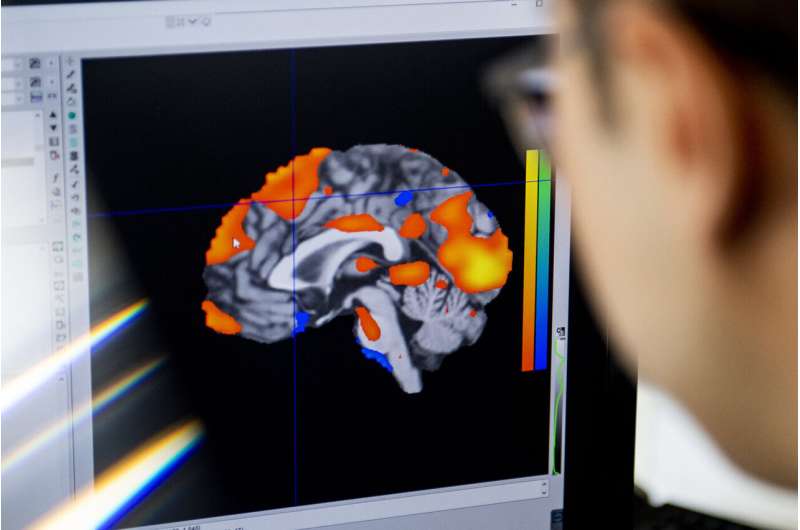How do you know not to laugh at a funeral? This region of the brain is key

Phineas Gage didn't die when explosive powder detonated and threw a 43-inch tamping iron through his left cheek, which went into his brain and out the top of his skull.
The railroad worker did lose vision in his left eye. But otherwise, he was functional, with full intellectual, cognitive, and motor capabilities intact up until his death 12 years later, in 1860.
What friends and family noticed, though, was how his personality changed—especially his emotions and behavior, according to The Smithsonian. Friends noted that he was "no longer Gage," and his doctor wrote that he swore a lot and had "little deference for his fellows." He eventually lost his job as a foreman.
Why did the injury impact Gage's personality so strongly? New research from Northeastern neuroscientists may help us better understand him—and ourselves as well.
In a study published in Social Cognitive and Affective Neuroscience, assistant professor of psychology Ajay Satpute suggests that the anterior portion of the prefrontal cortex—the portion of the brain where Gage was injured—is important in evaluating one's emotions and, ultimately, regulating them.
It may be hard to wrap your mind around the idea that we have thoughts and feelings about our feelings, but according to Satpute "we place judgments on emotions all the time." You can, for example, feel sadness, and feel that it's unpleasant to be sad. You can also think that it's good to feel sad, like, for example, during a sad movie.
Some emotions can come with this built-in contradiction: They can be pleasant but wrong, or they can be unpleasant but desirable. This is the difference between hedonic—or, how good an emotion feels—and evaluative—whether emotions are good or bad—emotional judgments. The evaluative component, the study notes, is influenced by social factors; for example, it is "wrong" to feel happy at a funeral, even if it feels good to be happy.
Evaluation is key for helping us to regulate our emotions in accordance with social norms, the study says. If you feel happy during a funeral, understanding that it is not "right" to feel that way will help you tamper that emotion. Or, if you're feeling angry, Satpute says, "you tell yourself, maybe I shouldn't be feeling anger, maybe this isn't good to feel anger." Maybe then, you will be less likely to lash out. In short, evaluation is a "stage toward regulation."
This, in turn, influences how we behave. "The knowledge that people have can actually shape people's experiences with emotions, and of course what they do with those emotions," says Kent Lee, a postdoctoral research associate at Northeastern and a co-author of the study.
Could this mean that Gage's post-accident behavior meant he had lost his ability to evaluate emotions?
Satpute's team may not know the answer to that; but they did find evidence that evaluations happen in the same part of the brain as Gage's injury. To do this, they studied 25 individuals, who were asked to make judgments about different emotions. Their brain activity, including which areas of the brain were engaged during the process, was studied using fMRI.
The researchers found that the anterior prefrontal areas of the brain—particularly the medial prefrontal cortex (mPFC), ventromedial PFC (vmPFC), and precuneus—were the most active when test subjects were evaluating their emotions as good or bad. This supports previous evidence suggesting that the prefrontal cortex is important for judgment, evaluation, preferences, and morality.
Lee says this is likely the first study that has looked at emotional evaluation when studying the brain. And while the study was just "exploratory," he says, "it is a very important stepping stone in trying to understand which areas of the brain are important in supporting emotional knowledge."
It could even have applications in mental health. Satpute says this new research could, in the distant future, help us understand those who behave in defiance of social norms, and even whether parts of the brain that help us control emotions can be exercised. Could Gage have worked to regain his ability to tell whether swearing was appropriate? Maybe someday we'll know.
More information: Kent M Lee et al, Sinful pleasures and pious woes? Using fMRI to examine evaluative and hedonic emotion knowledge, Social Cognitive and Affective Neuroscience (2022). DOI: 10.1093/scan/nsac024


















